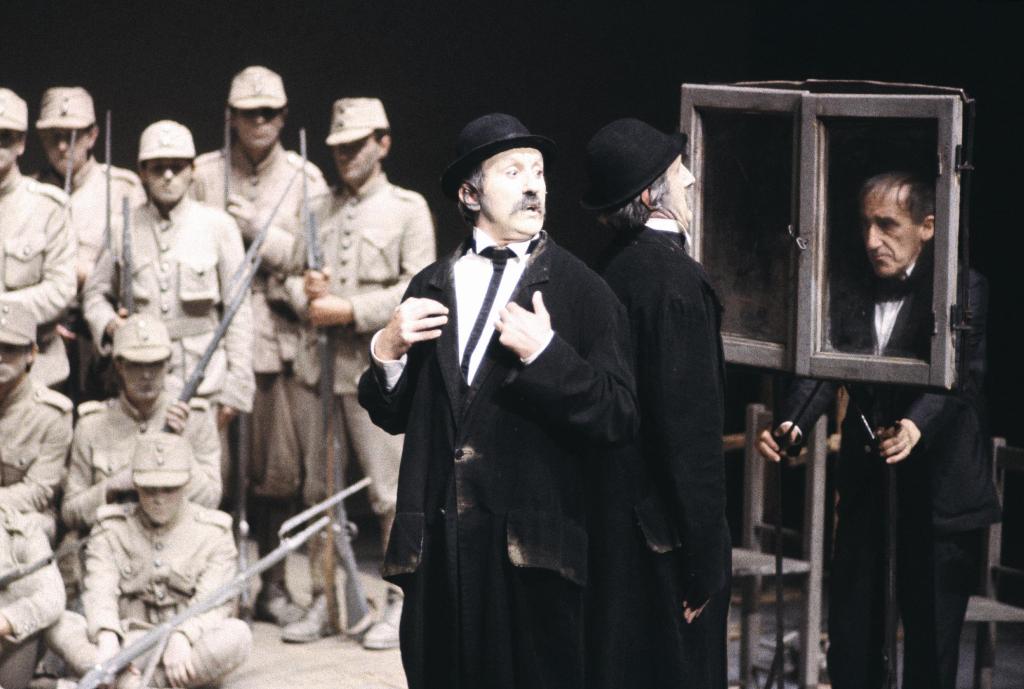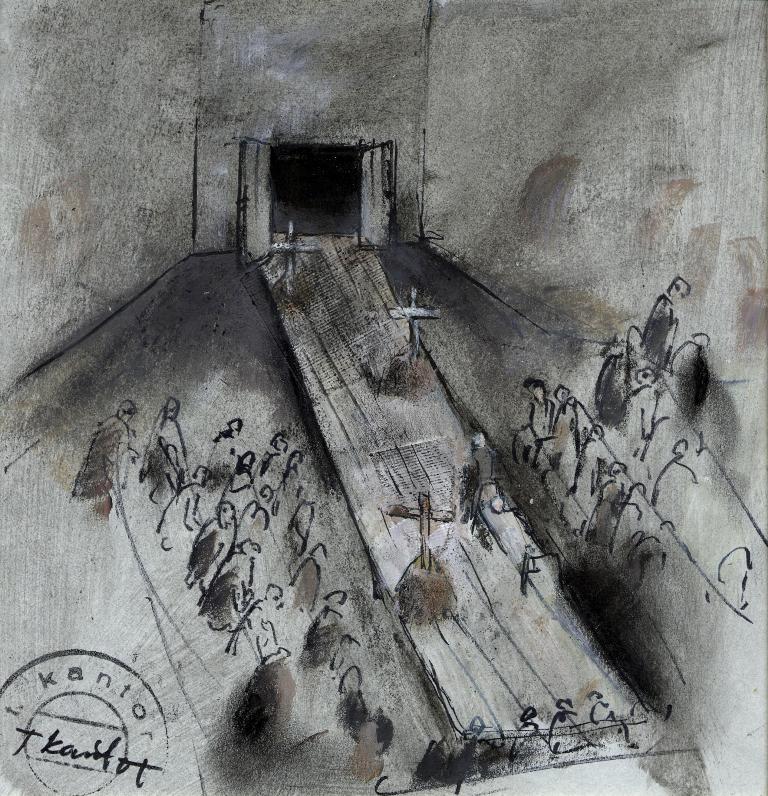homage to tadeusz kantor. a universal vision
works on paper 1947-1990


Trieste Contemporanea. Dialogues with the art of Central Eastern Europe 2010
HOMAGE TO TADEUSZ KANTOR. A UNIVERSAL VISION.
TADEUSZ KANTOR. WORKS ON PAPER 1947 – 1990
Trieste, Studio Tommaseo, via del Monte 2/1
Saturday, March 20, 2010
4:00 pm – films:
‘Umarla Klasa’ (The Dead Class) by Andrzej Wajda (duratation: 72 minutes), Poland 1976;
‘Kantor’ by Duncan Ward and Gabriella Cardazzo (duration: 40 minutes), London 1987.
conversation by Roberto Canziani (University of Udine)
6:00 pm – opening of the exhibition, curator Gabriella Cardazzo
inaugural speech by Carlo Montanaro (Academy of Fine Arts of Venice)
conversation by Valentina Valentini (La Sapienza University of Rome)
Trieste Contemporanea dedicates an exhibition and a series of investigative films and conversations to the great Polish artist, one of the most emblematic and eclectic figures of the 1900s. he initiative is promoted in the recurrence of the 95th anniversary of Tadeusz Kantor’s death and the 20th anniversary of his death.
The exhibition, organized by Gabriella Cardazzo and conceived in collaboration with the Academy of Fine Arts of Venice, the Cultural Association Artspace, the Galerie de France of Paris and the Studio Tommaseo of Trieste, will present 45 works on paper created by the great master between 1947 and 1990. These are drawings which Tadeusz Kantor used as preparation for theatrical events and even as an integral part of the stage scenery. Among these, is a group of drawings tied to ‘Death to the Artists’, a show which in 1985 stages the theme of artistic creation and the relation between memory, oblivion and identity.
The full day dedicated to Tadeusz Kantor on Saturday, March 20, will begin with the showing of :
‘Umarla Klasa’ (The Dead Class) by Andrzej Wajda (duration: 72 minutes), Poland 1976;
‘Kantor’ by Duncan Ward and Gabriella Cardazzo (duration40 minutes), London 1987.
Andrej Wajda, the celebrated director of the National School of Cinematography of Lodz, liberally depicts an emotional cinematic interpretation of the theatrical work: ‘The Dead Class’ which, after its debut in Krakow in 1975, had an enormous success, becoming a point of reference for the dramaturgy of the decades to come.
How the ‘Kantorian journey’ becomes part in this oppressing and cathartic representation in which personal obsessions, memories and unresolved and unsolvable problems without apparent solutions of continuity –which is how Kantor himself defined ‘The Dead Class’ – and how Kantor becomes part of the post-war avant-garde movement are the themes in the speech that will introduce the films proposed by the journalist and contemporary theatre expert Roberto Canziani, professor at the DAMS of the University of Udine.
The documentary film ‘Kantor’ by Gabriella Cardazzo and Duncan Ward is a dense and captivating immersion of the spectator into the world of the stage and the theatrical mechanisms of real theatre: the rehearsals, the director’s indications and the dramaturgical theories of Kantor, recounted by the director himself in an intense interview.
Gabriella Cardazzo is also responsible for two important insightful displays which will accompany the exhibition in Trieste: a series of photos which depict Kantor in the staging process of the work ‘Wielopole, Wielopole’ and the video program ‘Tadeusz Kantor. TEATR’ , produced by the curator for Artspace.
The rare material of Kantor’s exhibited is part of an important Parisian collection and come to Trieste after an exhibition which has just ended at the ‘Magazzini del Sale di Venezia’, organized by the Academy of Fine Arts. The director of the historical Venetian institute himself, Carlo Montanaro, will pass the testimony on to Trieste Contemporanea by officially opening the exhibit at 6:00 pm.
The conversation ‘The tangible stage’, by Valentina Valentini, expert in problems of shows of the 1900s and professor of Theories of Electronic Image for Shows at the Department of Arts and Sciences of the University La Sapienza of Rome, will follow. She has indicated in advance the relations she intends to trace in her intervention: the activity of Tadeusz Kantor expands and articulates in a series of skills: painting, drawing, sculpting, happening, theatre, without a solution of continuity – well-traced predecessors of tendencies and movements in Euro-American art. The drawings bring us back to the characters of his shows, as well as to his ‘Emballages’ (1962), and to the objects which transform themselves and incapacitate (the torture machines). Conceiving a show according the figurative procedures of abstraction and the informal meant, for Kantor, transferring on the theatrical stage the concepts of space, tension, movement, geometric shapes, such as the line and the point, affirming the autonomy of a show of naturalistic camouflage, a self-sufficient work, a pure product of the mind and of the human brain. At the same time it also meant representing the organic, the action that is brought forth from primary psychological and emotional situations such as fear, shame, suffering, violence; pathological states such as disease, old age, death; real facts and real places. The theatre of Kantor fully expresses the connection between abstraction and realism by removing the conventional artistic cover and the familiar utilization of the object.
The exhibition can be visited until May 12.
Hours are Monday through Saturday from 5 – 6 pm.
Admission is free.
Trieste Contemporanea. Dialogues with the art of Central Eastern Europe 2010
Homage to Tadeusz Kantor. A Universal Vision
Tadeusz Kandtor WORKS ON PAPER 1947 – 1990
Trieste, Studio Tommaseo, via del Monte 2/1
March 20 – May 12, 2010
Opening, Saturday, March 20, 2010, 6:00pm
Hours: Monday through Saturday, 5-8 pm
Free admission
Exhibition’s curator: Gabriella Cardazzo
Conversations: Roberto Canziani, Carlo Montanaro, Valentina Valentini.
Film: ‘Umarla Klasa’ (The Dead Class) by Andrzej Wajda (duration: 72 minutes), Poland 1976;
‘Kantor’ by Duncan Ward and Gabriella Cardazzo (duration: 40 minutes), London1987
displays: photographs by Gabriella Cardazzo;
video program ‘Tadeusz Kantor. TEATR’ by Gabriella Cardazzo, made for Artspace.
An initiative conceived by Trieste Contemporanea
In collaboration with the Academy of Fine Arts, Venice
Cultural Association Artspace
Galerie de France, Paris
Studio Tommaseo, Trieste
With the contribution of the Regione Autonoma Friuli Venezia Giulia
With the support of the Casa dell’Arte of Trieste
Info: Trieste Contemporanea
Via del Monte2/1, 34122 Trieste
Tel +39.040.639187
tscont@tin.it
www.triestecontemporanea.it